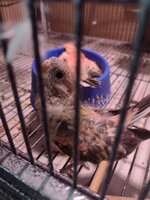RosyBourke
Moving in
- Joined
- 7/13/23
- Messages
- 12
My female Bourke abandoned her babies after they flew the nest, Bourkes still need to be fed for several weeks after that. I am trying to get them to take to handfeeding and they are refusing. I've tried just putting softened pellets in and they won't eat those. Right now I'm trying to get warm apple juice in them along with handfeeding formula but they're not getting much, the one is extremely weak. Any other ideas on how to get them to switch over to handfeeding so late?


